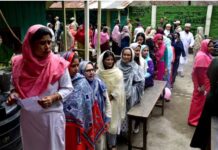Mostafizur Rahman Fizar
MP Mostafizur Rahman Fizar defends recent accusations made against him regarding 55 Kshatriya families facing eviction in Dinajpur
On a leisurely Saturday morning, my younger daughter brought to my attention a series of media reports which bore my name. Apparently, 55 Kshatriya families are facing eviction from their land in Parbatipur, Dinajpur, and that I am allegedly involved in the persecution of these people. One media outlet even printed a strongly-worded editorial on the issue.
I was as surprised as I was disappointed by the reports. This is the first time in my 30-year (six consecutive terms) as an elected member of the parliament that such allegations have been associated with my name. Typically, we accept smear campaigns to be part and parcel of Bangladeshi politics. But this practice needs to stop.
As a gesture of civility, I shall refrain from naming the media outlets and journalists who propagated this allegation, thereby perpetuating a lie. On the other hand, at least two English dailies made inquiries and refrained from making baseless accusations. Sadly, others did not. My greatest regret is that the latter neglected to engage in journalistic investigation or verification before reaching their conclusions. Such actions are an insult to the great hope and expectation placed upon free media in a democratic republic.
Such baseless “allegations” — when put into print and given time to incubate — grow into irrefutable “evidence” and remain as indelible smears on one’s career. As a citizen of an independent country, I refuse to let fabrications define my life’s work and my legacy. I shall start with a fairly-known and verifiable account.
I first became aware of the Kshatriya families in question about three to four years back, when they, along with other Muslim lessees (14 to 15 families) consulted me regarding their encumbered land. They claimed to be farming on land leased from the government.
Now, this was neither entirely true, nor untrue. I came to know that they were leased out a vested property, which, after lengthy litigation, had been reinstated (in 2002) by the Court of Law to the original owner: A certain individual, I am told, named Emdad Chowdhury. Consequently, the government lease to the families (both Kshatriyas and Muslims) was also cancelled after the verdict.
The real owner, as records will show, managed to legally reclaim the property after a 35-year battle (since 1967) with the state in 2002. For over 13 years, he has not only had the requisite deeds and paperwork, but also handover notice and judgments from the deputy commissioner and multiple courts respectively. It was on this land that the lessee families placed their claims.
It was with a sense of despair that I explained that the government did not possess the land anymore and, therefore, could not administer its use any longer. So, it was beyond my capacity to help them in any way. The owner was now free to do with his land — within legal bounds — whatever he pleased.
I empathise with the lessee families, just like I do with anyone else having to relocate under such circumstances. As their parliamentary representative, I still wish I could have done more for them. But I am a law-maker, and it is to the Constitution that my allegiance lies. Any change to, or claims on, the disputed land’s ownership status has to be effected through the legal system. That a fraction of the tenants are members of a minority group, has little bearing on the situation. These are the freely verifiable facts surrounding this case.
Readers will now understand my surprise at the renewed allegations in 2016. Until this new chapter, I had been consumed with the tasks of ensuring enrolment and getting textbooks to our schoolchildren — and had little time or inclination to follow land disputes. Following this rude awakening, I have first calmed my family and then turned my attention to the accusations.
As Bangladeshis and global citizens, we all have certain inalienable rights. One such right is that an individual cannot be pronounced guilty without the presumption of innocence and the existence of evidence. Yet, the media reports have effectively passed judgment, both on me and the constitutional office(s) that I hold. Readers may note that no investigation or interrogation was deemed necessary because I was not considered worthy of the presumption of innocence. Neither did the supposed vanguards of Democracy and Justice bother to provide any corroboration, let alone evidence.
The source has been mentioned as the president of the central committee of Bangladesh Puja Ujjapan Parishad, Kajal Debnath, who is quoted by all the media reports. Certainly, a man of his stature would not bring allegations against a sitting minister in jest; and that too at a press event! I have therefore personally requested Mr Debnath to furnish evidence to back up his claims two weeks ago. He has failed to do so till date. However, I am willing to allow him more time to support his case.
My disappointment extends to those editors and journalists who printed or relayed Mr Debnath’s claims without verification. There has long been a readiness in us Bangladeshis to believe, unconditionally, all allegations against politicians. This tendency — while not baseless — is so mainstream that even respectable media outlets regularly pander to anti-establishment sentiments.
Let us not forget that Bangladesh is on a modern growth trajectory, and her media must evolve with the changing times. Still, I believe our media professionals know that it is unworthy of them to print rumours and propagate slander. I believe they have both the means and the moral courage to remedy the damage that has been done.
I have said this before and I will say it again: If anyone can furnish evidence of my involvement in this matter, I shall willingly subject myself to legal proceedings. But if not, I expect slanderers to be ready for a similar fate.
Source: Dhaka Tribune










